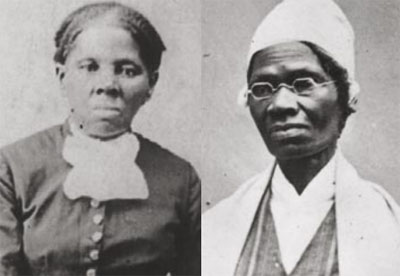国務省出版物
女性実力者の系譜-奴隷制度の鎖を断ち切る

(左)ハリエット・タブマン (右)ソジャーナ・トゥルース
19世紀半ばの米国は、自由を愛すると同時に奴隷を所有する、矛盾した社会でもあった。奴隷制度は、東部沿岸部の複数の地域で200年以上も続いており、南部の経済にとっては不可欠な要素だった。しかし、19世紀も終わりに近づくと、奴隷制度廃止運動はますます活発になり、米国の理想と南部での奴隷制度の慣行との間の大きな落差に焦点が当たるようになった。そして緊張が高まった結果、1861年には南北戦争の勃発へとつながった。エイブラハム・リンカーンが率いた北軍が勝利し、米国で奴隷制度が廃止されるまでに、血みどろの戦争が4年間続いた。
女性は奴隷解放運動で重要な役割を果たし、何人かは指導者として際立つ働きをした。後段で紹介する元奴隷ハリエット・タブマンとソジャーナ・トゥルースは、奴隷制度の邪悪さを、身をもって証明した。もう1人、白人女性のハリエット・ビーチャー・ストウは、1852年に有名な小説『アンクル・トムの小屋』を著した。この小説がきっかけとなり、特に北部の若い世代の有権者の間で、奴隷制度廃止の大義が熱狂的に広がった。この結果、ストウは熱心な奴隷制度廃止論者として歴史に刻まれることになった。そして、タブマンやトゥルースと同じように有名人となり、多数の集会で奴隷制度に反対する講演を行った。
黒人が解放され、アフリカ系米国人の男性に選挙権が与えられたことにより、多くの女性は自分たちが社会で不平等な立場にあることを認識するようになった。エリザベス・キャディ・スタントン、タブマン、トゥルースなどの奴隷解放論者たちは、後に、新興の女性運動の提唱者となった。
時代は変化し、女性たちは自らの意志で人生を決定する機会をつかんだ。大きな個人的犠牲と忍耐によって、タブマンやトゥルースのような女性たちは、奴隷制度という暴虐な行為からの解放と、すべての人のための人権という、高尚な目標の達成に生涯を捧げたのである。
*上記の日本語文書は参考のための仮翻訳で、正文は英文です。
Breaking the Chains of Slavery - American women help the new nation - Women of Influence
Women were vital to the emancipation movement
At the mid-19th century, America was paradoxically both a freedom-loving and a slave-holding society. In places along the eastern seaboard, slavery was more than 200 years old and an integral part of the economy of the South. But as the century advanced, an increasingly assertive abolitionist movement called attention to the gulf between the nation's ideals and the practice of slavery in the Southern half. Tensions grew and, in 1861, erupted into civil war. It took four years of bloody warfare before the North, under Abraham Lincoln's leadership, prevailed, a result that sealed the end of slavery in the United States.
Women were vital to the emancipation movement, and several stood out as leaders. Former slaves Harriet Tubman and Sojourner Truth, featured below, gave personal testimony to the evils of slavery. A third figure, Harriet Beecher Stowe, a white woman, wrote her famous novel Uncle Tom's Cabin in 1852. The novel inspired widespread enthusiasm for the antislavery cause, particularly in the rising generation of voters in the North. It secured Stowe's place in history as an ardent abolitionist. And, just like Tubman and Truth, she became a celebrity, speaking against slavery at many gatherings.
The freeing of the black population and the granting of voting rights to male African Americans made many women recognize their own unequal position in society. Emancipation adherents like Elizabeth Cady Stanton, Tubman, and Truth later became advocates for the emerging women's rights movement.
Times were changing and women seized the opportunity to take increasing control of their lives. By great personal sacrifice and perseverance, women like Tubman and Truth dedicated their lives to noble goals: freedom from the tyranny of slavery, and human rights for all.




